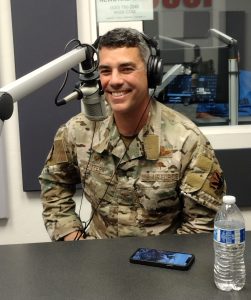Holiday separations are an unfortunate but necessary part of military service. As civilians we should recognize that the reason we are able to spend our holiday peacefully and safely with friends and family is because members of our military and first responder communities have volunteered to be apart from theirs.
This burden is particularly heavy upon those forces who, by the nature of their work, have a higher than normal deployment tempo. The Air Force Pararescue community falls into this category. Col. Jose Cabrera, Commander of the 563rd Rescue Group, joins us to discuss holiday separations and some suggestions to make it easier on military families.
Col. Cabrera has served our nation for over two decades, most of it with the Pararescue forces. The units under his command include an HJ-130J rescue squadron, two HH-60G rescue squadrons, three Guardian Angel rescue squadrons and an Operations Support squadron. Col. Cabrera shares some details about the nature of the Pararescue mission and the training required to join these elite forces and fulfill their motto “These things we do that others may live.”
Separated families can experience stress, depression, guilt and even anger. Witnessing the realities of war can also cause mental health issues that impact families as well. For this reason, Pararescue forces embed chaplains with all deployed units. Col. Cabrera emphasized that reintegration also presents challenges when military members have been apart from their family for so long and miss important milestones.
We discuss several suggestions for military families. These include pre-recording some of the children’s favorite bedtime stories, establishing new “traditions” that incorporate the separation and getting out of the house for new experiences and socializing as a family. In the tight knit Pararescue community, new spouses are prepared for the challenges of deployment by unit spouses with a bit more experience under their belts.
TAKEAWAY: “The first deployment is probably the toughest deployment for a family. You do get used to it over time but it is NEVER easy.”
Podcast: Play in new window | Download ()

